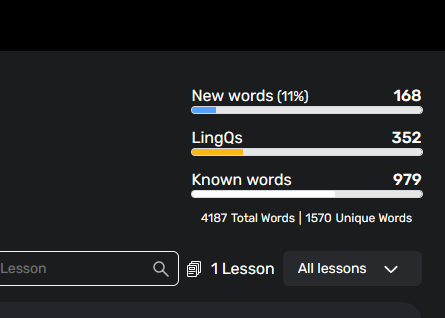Hi guys,
Sorry, no time for longer online discussions right now.
But just a hint:
why would they stick at all.
using ultra-reading while listening?
- If you can’t guess the words from context
(i.e., you don’t understand the meaning of the
words / word groups)
and
- (even if you understand the words / word
groups, but) they don’t occur often enough,
not much of the new vocabulary will and can stick.
However, that’s to be expected, right? ![]()
If you apply this RWL technique in the right way (selected material,
right number of unknown words in a text - say: ca. 10-15 percent of unknown words or less, varying audio speed, etc.) with the appropriate
" enhancements" (re-listening and use operations à la L1->L2 based on LingQ-to-Anki,
etc.), then it works quite well.
I’m applying it for Dutch at the moment, and I’m very satisfied with the results so far…
That said:
-
This technique doesn’t work with every text genre, esp. not with complex
literary / poetic, scientific and philosophical texts, and it doesn’t work
with texts where there are many unknown words (say, more than 10-15 %
unknown words) either. You can’t rush through such texts… -
My main criticism reg. (ultra)reading-while-listening is this:
It doesn’t do much for use-acquisition. But that seems to be the
problem of all input “purist” approaches (AJATT, MIA, Refold, etc.).
At least, in my experience, their efficiency is far too low (it’s almost like trying to get better at sprinting by jogging longer and longer distances at a slow pace).
Therefore, you need more use-operations (see the RWL “enhancements” mentioned above) to counter that…
Nice Sunday
Peter
PS -
BTW, no one should rely exclusively on “guessing from context” as a vocabulary acquisition strategy when applying (U-)RWL…
